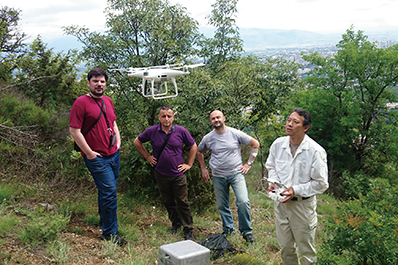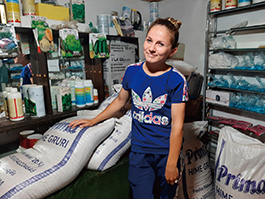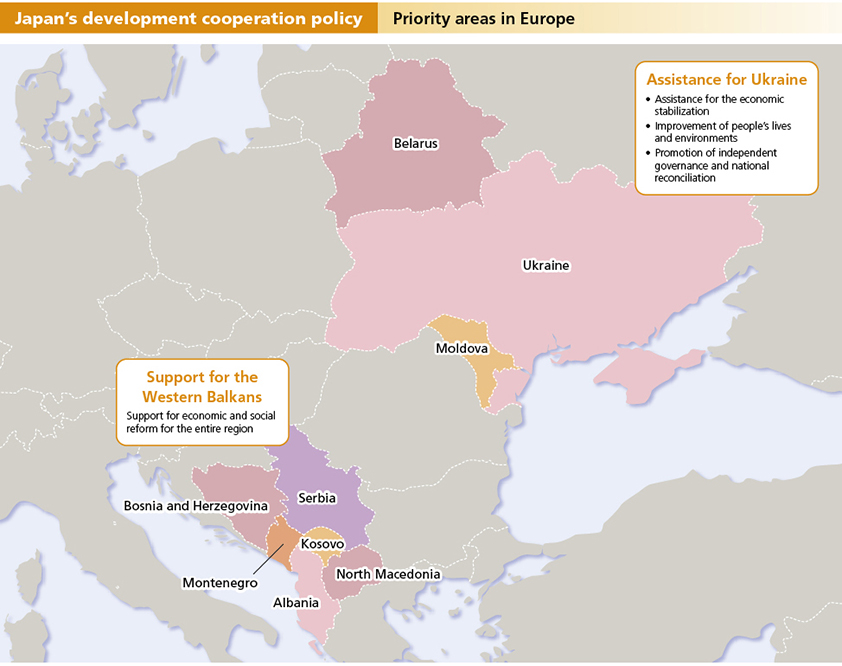5 Europe
Many countries in Central and Eastern Europe and of the former Soviet Union that were once under communist regimes currently pursue economic development based on market economies, however they face various issues.
● Japan’s Efforts

A Japanese expert piloting a drone to take aerial photographs for the “Project on Capacity Building for Ecosystem Based Disaster Risk Reduction (Eco-DRR) through Sustainable Forest Management in North Macedonia” technical cooperation in North Macedonia (Photo: JICA)
Japan provides assistance for efforts such as the reconstruction of economic infrastructure and addressing environmental issues, with the aim to further strengthen relations with these countries which share fundamental values such as human rights, democracy, market economy, and the rule of law, as well as to contribute to the further stability and development of Europe as a whole.
The reform of the Western Balkan countries Note 19 once slowed due to the conflicts in the 1990s. However, as a result of reconstruction assistance from various donor countries and international organizations, as well as reform efforts by the countries themselves, they have graduated from the reconstruction assistance phase and are currently in need of assistance for sustainable economic development. Japan, in support of a unified Europe, provides development cooperation in collaboration with the European Union (EU) and others. Under the “Western Balkans Cooperation Initiative” Note 20 (2018), Japan supports necessary socio-economic reform aimed at these countries joining the EU (see also “Project Introduction Column for efforts to improve financial services in Albania).
In order to encourage independent and sustainable economic growth in Ukraine, in 2021, Japan provided support in a wide range of areas such as developing the economic and investment environment, improving urban environments, and basic social services such as health and education. As for Eastern Ukraine, where there has been an unstable situation due to sporadic clashes between the government side and pro-Russia armed groups since 2014, Japan has provided assistance for displaced persons such as water supply and sanitation improvement, provision of shelters and repairing housing, and indirect support for reconciliation. Furthermore, through technical cooperation, Japan also provides budgetary and financial support training for capacity development of government bodies, operational support for impartial and fair public broadcasting to prevent fraud and corruption, and capacity development for waste management (see “Japanese Personnel at International Organizations Playing Active Roles on the Front Lines across the World amid the COVID-19 Pandemic” for the activities of Japanese personnel working in international organizations in Ukraine).
In 2021, Japan provided grant aid totaling ¥300 million to Albania, Kosovo, and Montenegro for the provision of health and medical equipment as support for the response to COVID-19.
In light of disparities in economic development in Europe, Japan will gradually reduce assistance for EU member countries, regarding them as ODA graduate countries, and encourages those countries to be donors in order to provide development cooperation more actively for developing countries in the region.
Albania
Smallholder Families’ Financial Inclusion Project in Albania
Technical Cooperation Project (October 2017 – June 2022)
Although Albania is a candidate country for EU membership, it remains one of the lowest income countries in Europe. The majority of the poor population is working in agriculture, which is an important industry that accounts for approximately 20% of the country’s GDP. However, many family run small farmers are scattered throughout rural areas, thus there is a higher cost for financial institutions to provide services to them. As a result, the current rate of bank account ownership is less than 40%, with only 10% of the population receiving loans among small farmers in the rural area. Therefore, it has become an issue to improve the access to financial services of the poor population and establish their economic and livelihood foundation.
The project provides a variety of assistance with its counterpart FED invest, Albania’s Savings and Credit Association, which provides financial services in rural areas. Through the project, the availability of bank accounts for online use has been promoted and training on financial literacy has been implemented. Convenience improved greatly, because now procedures can be completed online without having to go to the bank several times in person, and utility charges can also be paid by automatic transfer.
Furthermore, in response to farmers’ growing need for information on agricultural technologies, etc., the project established a support center and developed a mechanism that enabled farmers to, for example, directly ask questions to experts online and track the market prices of agricultural products. Moreover, a questionnaire survey, conducted under this project, revealed that an increasing number of farmers face difficulty managing their farms due to soaring price of the agricultural inputs such as seeds and fertilizer caused by factors such as the restriction of movement and the stagnation of goods distribution as part of COVID-19 countermeasures. Therefore, the project provided support of 40,000 Albanian lek (approximately ¥40,000) per farmer for the purchase of agricultural inputs, and many people expressed gratitude. And subsequently, the implementation of the second round was also decided and support was delivered to farmers in a total of 1,250 households.
Support will continue to be provided towards the realization of financial services under which “no one will be left behind,” including in rural and other remote areas while responding precisely to the needs of the farmers.

A woman running an agricultural inputs store (Photo: JICA)

An online system enabling people to learn the market prices of agricultural technologies and agricultural products (Photo: JICA)

- Note 19: The six countries including Albania, Bosnia and Herzegovina, Kosovo, Montenegro, North Macedonia, and Serbia.
- Note 20: An initiative aimed at encouraging socio-economic reforms of the Western Balkan countries toward EU accession and promoting reconciliation and cooperation amongst the ethnic groups.
